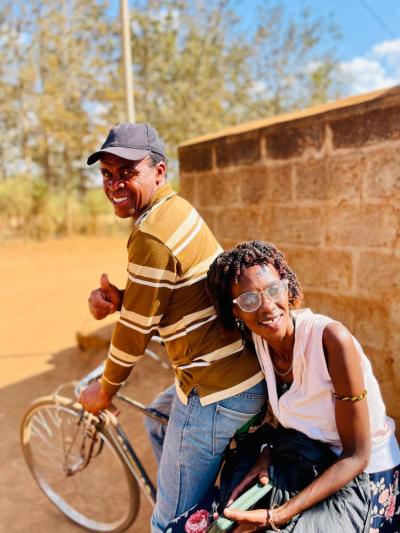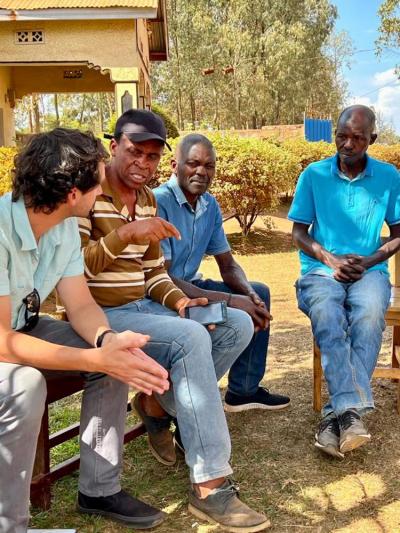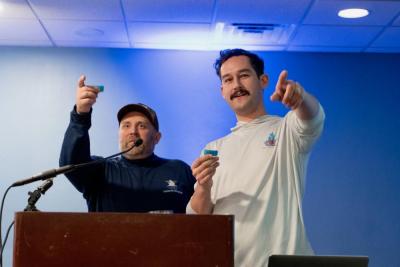Journey to forgiveness: How a look into the past shows the steps needed for the future

Traveling home to Wareham from South Africa, Tufts Professor Jonathan Tirrell sat in a London airport reflecting on his encounter with an 80-year-old woman who had walked three days to get 30 Tylenol which, she said “had changed her life.” He looked up to see a young woman simultaneously scrolling on her phone and belittling a barista for making her latte wrong.
The contrast made him wonder: What makes a good person? Answering that question is, in a way, his life’s work.
A research professor studying human development, Tirrell began his academic life looking at what makes children become “good people.” Over time that focus has broadened to the issue of forgiveness—and has taken him to work in the aftermath of some of the modern world’s most horrendous historical events.
Tirrell visited Rwanda in 2018 to learn both the country’s history and how its people have moved forward from the 1994 genocide that claimed the lives of around 800,000 people in 100 days.
"I went to the genocide memorial there and it was a stunning testament of forgiveness and reconciliation, not only for the people who reckoned with the genocide but also [those who] came to forgive their neighbors," Tirrell remembered. "People came to forgive their neighbor that killed their entire family. Ever since I have been working with genocide victims and perpetrators trying to understand how this transformation occurs."
Closer to home, he’s actively involved with Fishing for the Mission 22, a Buzzards Bay based nonprofit helping veterans deal with depression and suicide.
Tirrell’s father was a psychology professor at Stonehill College and his mother was a teacher at Bishop Feehan High School in Attleboro. Tirrell described his parents as “very service oriented” which helped spark his interest in his current work.
The Mansfield native moved to Wareham in 2020 with his wife and then 5-month-old daughter after spending many summers on Cape Cod with his family.
He attended Tufts as a graduate student before earning his doctorate from the school in 2017. At Tufts, Tirrell pursued the idea of what makes someone a good person professionally until his focus shifted to forgiveness during his doctoral research.
He spearheaded a project centered around forgiveness where he became fascinated with "this seemingly mystical phenomenon of transforming anger to empathy, pain to purpose and loathing to love."
Tirrell explained the project started in the Greater Boston area and soon received support from Compassion International, a major child sponsorship organization. The organization wanted to add more theory and evidence to their faith-based program, which allowed Tirrell to travel the world studying human development, in service of the organization’s mission.
"We were doing research in El Salvador which then expanded to Rwanda, Uganda and South Africa," he said.
In his travels Tirrell said he found how forgiveness occurs. It's no secret technique, and it's not a magic pill — it's simply sitting down and listening.
"When you bring people together and they listen to each other, engage in dialogue and truly understand each other, that's where forgiveness occurs, that's where peace building occurs and that's where character development occurs," he said.
He added that a monument wasn’t the only evidence of this, he witnessed victims and perpetrators of the genocide coming together to rebuild Rwanda.
"There was one guy, Albert, who was 17 or 18 during the attacks and he fled to a local church where 500 people were hiding," Tirrell said. "For six days, the perpetrators would systematically kill, breaking windows and throwing grenades and one of the perpetrators, Azai Nassan, and Albert are now living in the same village and working together to spread a peace building message."
Tirrell added that while forgiveness can be powerful, it's not easy.
"The first knee jerk reaction is that person doesn't deserve my forgiveness, that goes against justice," he said.
Through his research, he noticed several different parts of the forgiveness process. One of the first things he realized was forgiveness is not something given to someone else.
"Holding on to anger and resentment and not forgiving is like swallowing a poison pill and waiting for your enemy to die," he said. "Holding on to bitterness is only poisoning yourself and those that choose forgiveness are doing so to reclaim their life."
Choosing to forgive is one of the first most important steps, he said. Choosing to forgive does not mean everything will be perfect immediately. The healing process will take time and a good support network, but it is possible.
“A lot of mental health problems come down to loneliness or disconnection,” he said. “Peace is then found in community. When you’re connected to others, connected to yourself, your neighbors, your family or your community, that’s where you’re able to find a sense of forgiveness,” he said.
Once that journey is complete, the last step in the process is emotional forgiveness.
"Emotional forgiveness is when you realize you no longer hold contempt for someone and have compassion towards them," Tirrell said.
Tirrell said Rwanda was unique in that the country had no choice but to find a way to forgive and rebuild the nation — unlike the U.S. where people can “build tall fences and ignore each other’s neighbors.”
As a board member for Fishing for the Mission 22, Tirrell worked with the non-profits founder, Harold Skelton, a veteran who attempted to kill himself many years ago and was not able to find peace for most of a decade, Tirrell said.
Tirrell works closely with Skelton and said his research on forgiveness can be applied to forgive oneself, not just others.
“We talk about listening in three ways, listening to yourself, listening to each other and listening to your environment but the first listening is always to yourself,” he said. “When he came through that suicide experience he was hanging out under the railroad bridge at the Cape Cod canal looking up at the stars fishing, he was able to recognize what caused him to experience this pain and process that.”
One of the principles of human development Tirrell uses in his work is the idea that everyone is similar. He said commonalities can bring people together, as it has in Rwanda, or it can push people apart, as it has in the U.S.
“We have the highest level ever of negative partisanship or the idea that political party affiliation is based more on shared hatred for the other side than on shared values with one’s own side,” he said. “Each side of the political aisle is dehumanizing the other side and that is incredibly polarizing.”
Incorporating compassion for others is something Tirrell said he tries to work into his daily life and encourages others to do the same by exhibiting humility and curiosity.
“Say you’re on your way to work and someone cuts you off on the highway, that would probably piss a lot of people off and we’re so quick to dehumanize the other person,” he said. “There’s a practice of humility to recognize that if you believe you are worthy of respect then chances are everyone else is too.”


















